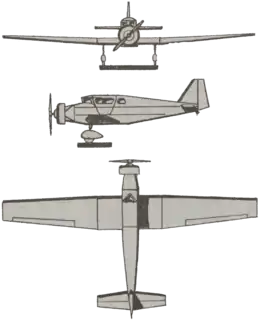Bloch MB.141
The Bloch MB.141 was a French all-metal two seat light aircraft derived from the Bloch MB.81 air ambulance. Only one was built.
| Bloch MB.141 | |
|---|---|
| Role | Two seat light aircraft |
| National origin | France |
| Manufacturer | Marcel Bloch |
| First flight | July 1934 |
| Number built | 1 |
| Developed from | Bloch MB.81 |
Design and development
The MB.141 was a low wing cantilever monoplane with a three part wing consisting of a rectangular plan centre section and trapezoidal outer panels. It was built around two spars and metal skinned; the leading edges were removable for maintenance purposes and the trailing edges carried high aspect ratio ailerons which filled about two-thirds of the outer panels.[1]
Its 110 kW (150 hp) five cylinder Hispano-Suiza 5Q radial engine (a licence-built Wright R-540) was mounted in the nose within a narrow-chord cowling. Behind it the fuselage was flat-sided, constructed from panels linked by frames which left the interior free of cross-bracing. The well-appointed cabin was 3.16 m (10.4 ft) long with two seats in tandem, fitted with dual controls, and a luggage space behind. The forward seat was behind a two piece, V-shaped windscreen and on each side there was a pair of windows; on the port side the largest of these was in the large, trapezoidal door.
Behind the cabin the fuselage tapered to a conventional tail with straight-tapered, square-tipped surfaces. The tailplane and elevator were mounted near the top of the fuselage and well ahead of the rudder hinge. The control surfaces were not balanced.[1]
The MB.141 had a fixed tail wheel undercarriage with a track of 2.80 m (9.2 ft); its main wheels were mounted on vertical, faired oleo struts and had brakes operated by a lever on the control column. Its small, castoring tail wheel also had a shock absorber.[1]
Its first flights were made towards the end of July 1934, piloted by Bloch's test pilot Zacharie Heu, who spoke highly of its handling.[2] It has been described as "too heavy",[3] possibly underpowered as it weighed a little more than the MB.81 but had a less powerful engine. It was also expensive to construct, so only one MB.141 was built.[3]
It is unusual for an unflown prototype aircraft to be the first prize in a lottery but in April 1934 the MB.141 was donated by Marcel Bloch to the Ecole Nationale Supérieure de l'Aéronautique.[1] The lottery was advertised in the French aviation press[4] and drawn on 22 July 1934; the winning ticket was announced at the end of August.[5]
Specifications

Data from Les Ailes April 1934[1]
General characteristics
- Crew: One pilot
- Capacity: One passenger
- Length: 7.80 m (25 ft 7 in)
- Wingspan: 12.60 m (41 ft 4 in)
- Wing area: 17.80 m2 (191.6 sq ft)
- Empty weight: 600 kg (1,323 lb)
- Gross weight: 950 kg (2,094 lb) normal
- Max takeoff weight: 1,100 kg (2,425 lb)
- Fuel capacity: 300 litres (66 imp gal; 79 US gal)
- Powerplant: 1 × Hispano-Suiza 5Q 5-cylinder radial, 110 kW (150 hp) nominal, 130 kW (180 hp) equivalent
- Propellers: 2-bladed
Performance
- Maximum speed: 210 km/h (130 mph, 110 kn)
- Cruise speed: 180 km/h (110 mph, 97 kn)
- Range: 1,500 km (930 mi, 810 nmi)
- Service ceiling: 6,000 m (20,000 ft)
- Take-off run: 100 m (330 ft)
- Landing run: 120 m (390 ft)
References
- Frachet, Andé (12 April 1934). "Le biplace de tourisme Marcel Bloch "141"". Les Ailes (669): 3.
- "A Villacoublay". Les Ailes (689): 18. 26 July 1934.
- "Dassault Aviation - MB.141". Retrieved 21 February 2016.
- "Lottery". Les Ailes (669): 3. 12 April 1934.
- "Ici et la". Les Ailes (684): 16. 30 August 1934.